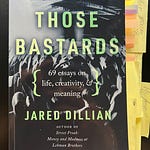You can listen to the episodes at: Spotify, Apple, at anchor, and via RSS. Find Transcript here.
Hello everyone.
I’m very excited to share with you all a conversation with my friend Dan McMurtrie of Tyro Partners. The entire interview is about a topic that I believe is under-discussed but of vital importance to any investor: resilience and recovery when dealing with sustained pressure and stress. I believe mastering this challenge is crucial to longevity in investing.
A number of great investors have commented or hinted at the mental and physical strain from a combination of market volatility and personal or business issues. Many retired because they were simply too exhausted and burned out to continue. I will share a few examples below to illustrate the point.
However, I also believe that the topic is uncomfortable to discuss for many professional investors. It requires an openness that could be interpreted as weakness by peers, LPs, and other stakeholders. For that reason I am especially grateful to Dan for sharing his perspective.
Dan credited a mutual friend of ours, Alix Pasquet of Prime Macaya Capital, as a “mentor, great friend, cherished collaborator, and invaluable teacher” on this subject and many others. I look forward to recording a conversation with Alix as well.
I hope you find this conversation as insightful and valuable as I did.
You can listen to it at: Spotify, Apple, at anchor, and via RSS.
I will also send out a full transcript to premium subscribers.
Why this matters.
George Soros on the stress of managing his fund before hiring portfolio managers to do it for him:
“It turned into an internal conflict where I felt the Fund was an organism, a parasite, sucking my blood and draining my energy. I asked myself, who is more important, the Fund or me? Is the Fund a vehicle for my success, or am I the slave of my Fund?” Soros on Soros
Peter Lynch retired early, at age 46 in 1990, and openly discussed his workaholism and the toll it took on his family life:
Early in his career, Bill Miller asked Lynch for advice. Lynch told him that the investment business is so rewarding financially and intellectually that it attracts an overabundance of intelligent people. “The only way you can beat them is to outwork them,” said Lynch, “because nobody is just so much smarter than the next person.” Lynch told Miller that he stayed ahead of the pack by reading investment research while he carpooled to the office at 6:30 a.m., working after dinner and on weekends, and taking no vacations for years. When Miller asked if it was possible to slow down as you got older, Lynch replied, “No. In this business, there are only two gears: overdrive and stop.” Richer, Wiser Happier
In a profile in Financial World, months before he announced his early retirement:
“I've worked every Saturday for seven or eight years - I mean seven in the morning. In the last six months I've started working some Sunday mornings at home. … I haven’t gone to a Celtics game in five years. … You think I enjoy coming in here on Saturday mornings? Don’t you think I’d rather be playing with my kids or doing something with my wife?”
From a Barron’s piece covering his retirement announcement:
“It's like - one hot fudge sundae is great, two are okay and five just makes you sick. I love this job. I love outside activities. I love my family. There's just too much of it.”
Stanley Druckenmiller looking back at the moment he bought back into technology stocks at the top of the dotcom bubble, a bet that led to his departure from Quantum shortly thereafter (and a story I will discuss in greater detail in my profile on him):
“You ask me what I learned - I didn't learn anything. I already knew I wasn't supposed to do that. I was just an emotional basket case and could not help myself.” Speech at the Lost Tree Club
Julian Robertson also retired near the top of the dotcom bubble:
“One former cub recalls that when he joined Tiger in the 1980s, he admired how Robertson rarely worked on Fridays and took plenty of time off to spend with his family at their home in the Hamptons. ‘He had a good lifestyle,’ the former cub remembers. But as the fund and the company grew larger in the 1990s, he says, Robertson ‘started working like a dog.’”
Institutional Investor: Do you ever regret that you decided to close down your funds?
“I really don't. I can't do this forever. I'm not on the phone for an hour early in the morning from New Zealand [his second home]. I just couldn't wake up at age 95 worrying about my partners' money. I love my life so much now. In hindsight, I might have been better off closing two years earlier.” The Tiger in Winter
Scott Bessent on investors flailing under pressure (losing their “distance” as Dan might describe it):
"George [Soros] wasn’t bothered when people started losing money, but he was always worried they weren’t feeling the pain because it was his money and not theirs. If people managing his money were down and he saw their trades getting bigger, he’d pull the money immediately. If the manager was down and their trading volume picked up dramatically, he’d pull it. The worst thing you can do when you’re having a hard time is flail. In trading, when there is nothing to do, the best thing to do is nothing.” Inside the House of Money
Paul Tudor Jones on the impact of divorce:
“Like, one of my No. 1 rules as an investor is as soon as my manager, if I find out that manager is going through divorce, redeem immediately. Because the emotional distraction that comes from divorce is so overwhelming. The idea that you could think straight for 60 seconds and be able to make a rational decision is impossible, particularly when their kids are involved. You can automatically subtract 10 to 20% from any manager if he is going through divorce.”
“We find that marriages and divorces are associated with significantly lower fund alpha, during the six–month period surrounding and the two-year period after the event.” Limited Attention, Marital Events, and Hedge Funds
Bill Miller on working through a severe drawdown during the financial crisis, as recounted in Richer, Wiser, Happier:
“Miller … describes himself as “very emotionless.” When stocks sink, his default mode is to remain calm and cheerful, actively welcoming the opportunity to profit from other investors’ emotional disarray. But the pressure was so unrelenting during the [financial] crisis that he gained forty pounds. “When I get stressed, I eat or drink,” he confesses. “I wasn’t about to eat salmon and broccoli every night and drink mineral water. … There’s only so much pain I can take, and I drew the line there.”
Paul Tudor Jones risk control memorandum to his traders from 1994:
“When a trader draws down from peak, a series of proactive pre-determined measures will be implemented to assist the trader in regaining profitable form. A self-evaluation process will be required … Additionally, drawdowns will be accompanied by reduction in trading size, trading for liquidation only, and vacations.”
💡 You could be sponsoring posts like this one if you are looking to reach 8,400+ thoughtful investors and many more readers on Twitter.
A few of my favorite quotes:
“You'll hear a lot of managers say, Hey, I bought the market in the financial crisis, but they're probably not going to get on TV and say, and I threw up in the trashcan for it.”
“Nobody wants to admit that a physical problem could inhibit a firm because the firm is supposed to have process and procedure and all of these things. But the issue is when everybody in the farm is facing these same stresses at the same time, all of a sudden you have individual capacity decline and simultaneously you start to have more committee effects where people start making lowest, common denominator decisions, and people start looking for plausible deniability, or they start looking for cover for the decisions.”
“I operate on what I call the ‘yes principle.’ Your day is a series of things you said yes to. I said, yes, to getting on this call. I said, yes, to reading an email earlier. I said yes, to responding to that email. I said, yes, this, this this. The things I'm saying no to, they don't really exist from a certain perspective.”
“When things go wrong, you're short a put on your own time.”
“Think about it like a team, like a sports team. We need to have players who can execute plays at all times. And in order to have people who can execute plays at all times, some people have to have some Gatorade on the bench and let's just accept that and engineer around it.”
“One of the things that I've talked to you about is when I studied really great investors people who have outside track records of 20 or 30 or 40 years plus there is a habit of, I’d be slightly hyperbolic to call it laziness, but I think about it as a certain sort of tactical laziness. So it's really more an economy, an economy of motion where a lot of them have this ability to sort of calmly sit and observe and not expend very much energy for long periods of time. And then strike very aggressively at a certain point in time. It’s not that they're doing nothing during the observation periods. They're just slowly accumulating information and observations and they're gaming things out in their head, but really, really low sort of metabolic clip. And it reminds me a lot of looking at any real large, physically large predator in the animal kingdom. They all like just don't move for a lot of time.”
“So many of these people who are great investors, you know, there's a lot of investors who had great track records and then there's a big crisis or something like that. And they do well in it. But at the end that the other side of the crisis, that's when they hang up the gloves, they go, look, I just can't anymore. I'm toast. There's a real cost to be paid for this.”
“I think a lot of people are very angry at themselves and angry at others because they miss something or because somebody else had to trade on that they make money on, you have to detach yourself from that. Because as long as you're festering on the Fed or the growth guys or the commodity guy, whatever it is, as long as you have of somebody you think you're fighting against in markets, you're, you're not seeing things clearly, you know, your brain is reformatting all the information to that. And that's something that really a lot of people fall prey to is they create a nemesis in the markets and under times of stress.”
Books and coaches mentioned:
The Intelligence Trap, David Robson
The Score Takes Care of Itself, Bill Walsh
How Champions Think, Bob Rotella
The Money Game, Adam Smith
Education of a Coach (about Bill Belichick), David Halberstam
The Art of Learning, Josh Waitzkin
Questions, time stamps, and highlights:
[Time] – [Question]
[00:01:00]: Introduction. Why is resilience important?
“A lot of people can look good for one to three years, maybe five years. But the number of people who can really continue to perform for 5, 10, 20 years is fractions of that. And so many people who are genuinely brilliant and great across the board, they simply burn out in a way they can't recover from. This has been the end of so many careers it's just, they get into a position where almost they can't function. And if you talk to anybody who has serious experience in money management, they've seen this happen or they've experienced it.”
"What almost no one in the market right now has experienced is an extended period of pain. And, you know, there's a lot of evidence across over fields that isolated periods of stress impact, and individual very differently than extended periods of stress. Extended periods of stress start to wreak havoc on your neurology, your hormone system, everything about how your mind and body function are damaged there."
[00:07:00]: Where to find good advice? How to broach the subject?
“It's not about how you function most of the time is how you function in the 10ish percent of time when things are bad, it's kind of the same thing in relationships, in other areas of your life. Most people are fine most of the time. The question is how are they when things get bad.”
“A lot of times you have to go through some of those periods in order to sort of unlock those conversations with other people. I think it's, it's not that people don't want to impart that wisdom to you. If you're a younger person, it's just that their brain blocks that information from them as well.”
“A lot of times when the market's crashing, people are also getting divorced people whose kids are having behavioral problems at school. All these other things are happening. And what happens there is that the way the firm and the portfolio manager and everybody around the ecosystem, the LP, et cetera, the way everybody was interacting and acting within themselves and acting with other people, all of a sudden stops working. … These periods of extreme stress that come along where a lot of things you take for granted on a given day stop working and the decision-making ability of the firm, not the quality, but the ability to make decisions, collapses.”
[00:20:00]: What are the different dimensions in which this matters (i.e. individual vs. team)?
“I operate on what I call the ‘yes principle,’ which I think, like at the end of your life or at the end of your day, really, not need to get morbid about it. At the end of your day, your day is a series of things you said yes to. I said, yes, to getting on this call. I said, yes, to reading an email earlier. I said yes, to responding to that email. I said, yes, this, this this. The things I'm saying no to, I'm not, they don't really exist from a certain perspective. It's just the things that I am saying yes to passively or actively. And so I think you have to begin with looking at what are the things you want to be accomplishing and you want to be doing.”
“When things go wrong, you're short a put on your own time. So there are certain types of investments where if something goes wrong or the thing is down, you go, okay, maybe I need to spend an hour rechecking something, or maybe it's a buying opportunity, something like that.
But there's other things where if you wake up and it's down 20% or something. It probably means something really serious has changed. You may have to go have an analyst or yourself go spend tens or hundreds of hours re-underwriting whatever, but you're gonna have to do that at a time of stress at a point when the, when the forward returns of everything else are going up.”
“And so you need to be thinking about under the position of stress. Do you want your investment team running the exact same process or do you want to simplify it? So one of the things we try to do is at the portfolio level, we want to ensure that in times of stress, the portfolio structure is simpler and that the liquidity is higher, which are two constraints we're imposing ourselves on ourselves in normal times that benefit us in stressful times. But also in the investment process, we actually have a dashboard that shows the entire investment process as a manufacturing process. And I can click one button and it will make 75% of the projects disappear because they are not relevant.”
“I also want to make sure that in the investment process that we really trim down to having people do things that they're already very skilled at, that they can almost, you know, in, in the military and athletics, you want to get, you want to get most movements down to where people can do them without thinking. And so it's the same thing really here with investing. It’s I want to give people more time to sleep, more time to have good meals, like feel physically comfortable. And I want them to do things they are very practiced at under times of stress.”
“Think about it like a team, like a sports team. We need to have players who can execute plays at all times. And in order to have people who can execute plays [00:35:00] at all times, some people have to have some Gatorade on the bench and let's just accept that and engineer around it.”
[00:37:00]: Which non-investment areas offer useful insights?
BUD/S training: “Even in the most harsh military environment, in a training context that I'm aware of, probably their worst, but it's the one that's famous. The constraint that everyone leans on is the human reality of eating food. And I think that's a powerful lesson in, in really everything is that there are bedrock realities that you just have to admit and work around.”
“You know, one of the things that happens sometimes the day traders and prop traders is they, they can't sleep because they're having adrenal burnout from the stress of trading, all day. And that's just absolutely horrible for your performance. So you need to monitor those things and you need to monitor them without judging them. And then you need to look at, okay, first let's, you know, let's do triage. You go home, you sleep, you eat, you know, and very important you do not threaten anybody's role with anything that you're doing this. And then later you can go in, you can look at how we're gonna prevent that from happening. And usually it's just earlier response.”
“You had a few bad beats at a table. I mean, I used to live in Vegas and I played cards professionally for a while. And you know, when you're getting, when you have a couple bad beats and you're just pissed off about it and you're tired and you know, you want to beat that guy cause he's gotten two crazy bad beats on you in a row.
You know, the younger man says, I gotta take that guy's head off and more experienced player says, I'm going to go I'm going to go hop on the stationary bike for 20 minutes and then I'm going to go take a nap and then I'm gonna have a nice salad. And then I'm going to go to a different casino and sit down at a table in there and then I'm gonna play there against completed. And you have to lose the pride of wanting to beat that guy. And you have to let go of the anger of what happened and you have to forgive yourself and you have, you have to have a show. You have to be like a goldfish. It always comes back to Ted Lasso.”
[00:50:00]: What are specific best practices? Are these idiosyncratic or are there universal themes?
“I break all this stuff down into kind of three categories: ritual, rhythm and distance.”
Sleep, diet, exercise
“I really like lifting. I find that for me, personally, lifting heavy weights makes me feel much better. It's what I call a Keystone behavior. I always look for behaviors where if I do this one thing, the probability of my other behaviors being good increases. So if I lift heavy weights, even if I go on for 20 minutes, I sleep much better. I feel much better just walking around. You know, it improves my hormones and things like that. According to my blood tests it makes me want to eat healthier things
So it's kind of addictive in a good way there. So if you can find something like that, that kind of is a Keystone behavior that sort of holds all the other good behaviors in place.”
“Exercise is good. And specifically anything that’s elevating your heart rate for a period of time, especially when you're very stressed. I think if you've been in markets, you've been in the PM seat, you've felt the, as a Matthew McConaughey put it in Wolf of Wall Street, the above the neck mustard shit where it just you're sitting in a desk and nothing's happening and you feel your entire body's like feels compressed intense and it's almost like a heat throughout your body where you just feel very uncomfortable and nothing's happened. And it's just the stress building up of your brain, responding to all these stimuli. And the only way I've found to just short-circuit that is to go, just hop on an elliptical or whatever, and just get your heart rate up to, I don't know, 130, 150, whatever your level is for your age and health and whatnot. You know, for 15 or 20 minutes and it is amazing. Like, there'll be, you'll put on some music. You like, you just sit there, retarded, put an audio book, whatever, 20 minutes and your emotional state will completely reset. And it's a superpower.”
“Rhythm is how all these things are mixing together and you should be able to notice, like we track every product, every he's working on what people are doing, and you can kind of see when things are humming.
What you notice when you have a significant market drawdown or some other problem is you'll notice the rhythm of the firm become disrupted. And so we can see that and you can see that in email traffic, you can see it in like the messages people are sending around. You can see it and how people are posting updates on their ideas, things like that. Like you can, you can also just feel it like, and the other thing is, as a leader of a firm, if you're not in a good place, your ability to sort of feel the force in your own firm is diminished.”
“There’s this concept in grappling or boxing or any like martial arts of distance.”
“There's kind of a metaphor or something there about, you know, when you're really engaged with an individual project or when somebody is really obsessed with one particular problem, that same thing happens where it starts to, you know, it's kind of you stare into the abyss and the abyss stares into you. Where it starts to dominate that person's mind and all of a sudden they become blind to everything else. And then their, their flexibility decline similar to being in a clench in a, in a combat sport. Versus, you know, if you're the coach standing on the sideline of the ring, you look at the guy and you go, obviously he just needs to step to the left and he could just do this movement win. But the guy in the, in as close to it can't see. And it's not just that you literally can't have the perception, but it's also that your body and your mind are adapting to that closeness.”
“When that when you have a crisis or you have some crazy thing that goes down, there's a lot of people who make money in the crisis, or maybe immediately after. And then they're just kind of different people. And after that, and they can't adapt anymore, like, they've become so hardened by this extreme stress. Like a lot of people I think disrespect it and they say, oh, that guy's stupid. Or he can't adapt. It's not what happened. What happened is these, these guys neurologically went through something that most people can't even conceive of.
And you know, it doesn't mean their decision making was correct or a wrong, but you know, what, what happens to their body and their minds going through? I mean, I can't imagine being somebody who shorted the housing bubble in size, who was being ridiculed for three years like that is, you know, so terrible from a neurological standpoint.”
“Where you are today is irrelevant. The only thing that matters is the change. The rate of change over time, you cannot control where you are today because that already, right now already have. So only you have to focus on is just, you have to immediately make the changes so that tomorrow is better and tomorrow is better and so on. And once you start inserting the ritual you can start to build a rhythm around it. And once you build a rhythm around it, then you can start to look at, okay, how are we monitoring the distance and the team.”
“And so the goal, this is another money game line is the goal of investing under stress is serenity. The goal is if, if you can, in times of extreme stress, get your life to be mundane. That's a victory. That's perfection. That's where we're going.”
Enjoyed this piece? Please let me know by hitting the ❤ button. It makes my day to see whether my readers like the content (it really does!) Thank you!
If you enjoy my work, please consider sharing it with friends who might be interested.🙏















Share this post